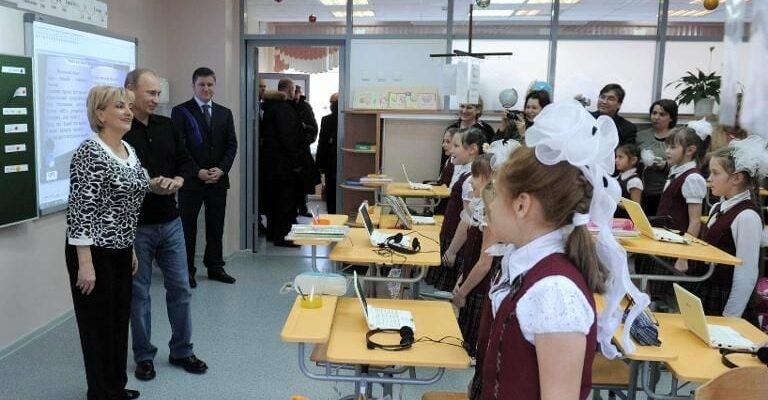Vladimir Putin assures us that he will deal with “the bandits who have penetrated into Russian territory, in the Kursk region, and who are trying to destabilize the situation in the border territories as a whole.” These words were not spoken during a ministerial meeting, but in a classroom where he met with students. A choice that is not insignificant, because for this third return to school since the Russian invasion of Ukraine, war is invited to the school benches.
From the beginning of the school year, high school students will be able to learn how to pilot combat drones, according to the curriculum published by the Ministry of Education at the end of August. According to the new roadmap, Russian teenagers will be able to learn about “the means of military use of drones” or how to “conduct reconnaissance missions using a drone.” And so what if math and science are cut back.
Students will also have the opportunity to “conduct concrete drone piloting actions”, as well as learn how to counter “adversary drones”. The classes concerned by these courses correspond to the 15-17 age group, as part of “initial military training”. This training, which existed in the Soviet era before falling into disuse, has been relaunched for the start of the 2023-2024 school year.
A patriotic turn of the screw
It includes familiarization with weapons of war such as the Kalashnikov assault rifle and includes at least 140 hours of curriculum. “The introduction of such a subject in schools will allow citizens to be systematically prepared for a possible confrontation with the enemy,” justified in November 2022 the parliamentarian Sergei Mironov, at the origin of the initiative. Drones are massively used in the conflict in Ukraine by both sides and Russian territory is targeted almost daily by attacks of this type. The objective is that by 2030, 4,872 classrooms and 380 training centers on teaching drone control will equip the country’s schools, reports the Russian daily Novye Izvestia, taken over by The Figaro.
In addition to introducing the military apparatus into schools, the government is expanding the already well-established patriotic education program. This year, students from 3rd to 12th grade (8th to 11th grade in Russia) will be required to take a new weekly course called “Basic Principles of Security and Defense of the Fatherland,” it further specifies. The Figaro. Teaching will be provided by teachers but also by soldiers returned from Donbass where what is still officially called the “Special Military Operation” is taking place in Ukraine. And for students who refuse these courses? Sanctions are to be expected.
An introduction to family values
Since the beginning of the conflict, several innovations designed to instill patriotism and carrying an anti-Western discourse have been introduced in Russian schools. The school week thus begins with the national anthem and a flag-raising ceremony and “discussions on what is important” have been introduced, in particular to evoke the hostilities in Ukraine and justify the Russian offensive against its neighbor. During an hour of lessons, Russian students are explained why the Kremlin wants to “denazify” Ukraine or other, sometimes lighter, subjects of daily life are discussed. At the start of the 2023 school year, it was new history textbooks, reworked in Putin’s style, that appeared on students’ desks.
In addition to using schools as a sounding board for Kremlin propaganda, the authorities are using them to “boost” the country’s fertility. Through courses called “Family Studies,” young people will be introduced to family values. An initiative that responds to a demographic decline that has been commented on for years in the country: according to the Russian State Statistics Service (Rosstat), the Russian population (145.9 million, as of July 1) fell by 321,000 people in the first half of this year, compared to 272,000 in 2023 over the same period. And the latest figures from Rosstat fear the loss of more than 15 million inhabitants in less than thirty years. Figures that, in the long term, could thin the ranks of the great Russian army.
